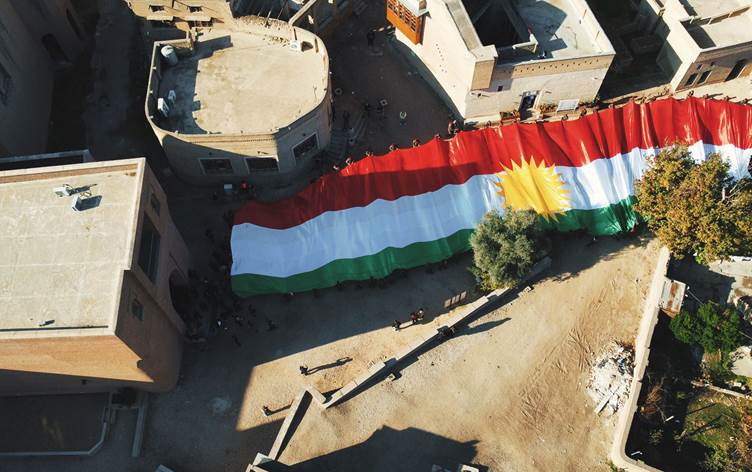For an extended period, the Kurds masterfully portrayed themselves as the shining exemplars of the 'other Iraq,' a bastion where free speech flourished, public interests were prioritized, and internal disputes were deftly concealed. This narrative found its roots in the personal experiences of the late Jalal Talabani, Secretary General of the Patriotic Union of Kurdistan (PUK), and Kurdistan Democratic Party (KDP) President Masoud Barzani, who bore witness to the triumphs and tragedies that shaped Kurdistan's struggle for safety and sovereignty. Through these struggles, they came to value the preciousness of their hard-fought gains. However, the current scenario paints a different picture, as the region steadily backslides month by month.
While other countries in the Middle East are fiercely competing to position themselves as the most transformed nations, the Kurds find themselves languishing in a primitive stage. Basic tasks, such as holding timely elections, seem insurmountable challenges. Regrettably, we have struggled to establish a robust domestic social policy and a comprehensive economic framework on various fronts.
Amongst the Kurdistan Region's allies, frustration simmers, and voices grow louder in expressing dismay at the mounting sacrifices and losses incurred due to the ruling parties' abysmal communication. These concerns have been voiced discreetly, but the local authorities appear heedless, seemingly indifferent to the potential repercussions. The looming specter of an existential threat hangs overhead, and the United Kingdom and United States, once idealistic champions of democracy and freedom, no longer seem inclined to plunge headlong into conflicts they are fervently attempting to avert.
One cannot help but wonder, why do the ruling parties not listen? The entire international community, positioned in Iraq, clamors for the Kurdistan Region to embrace elections, even in the face of the recognition that the Region is not yet a full-fledged democracy. The significance of institutionalizing timely elections cannot be understated, for it holds the key to shaping the region's long-term future.
It is worrying that there is a coldness between the Kurdistan Region and the diplomatic missions, and they are increasingly frustrated with the lack of political willingness to negotiate and reach solutions. So far, there have been a number of meetings and discussions to resolve the issues, but little has changed, raising doubts among many that Kurdish officials are unwilling to act on these concerns.
Consistent messaging from both the US and the UK reverberates, urging the Kurdistan Region to take decisive action: hold elections, unite the Peshmerga forces under the Kurdish government's banner, strengthen institutions, and strive towards an inclusive Kurdistan that transcends the boundaries of elitism.
Yet, the leaderships’ declarations of supporting free and fair elections and unifying military forces often ring hollow, with minimal effort expended to transform promises into tangible reality. Similarly, there is an overwhelming perception among the diplomatic community that freedom of speech and media freedoms are under intimidation and on the decline.
The Kurdistan Region's influence may be modest on the global stage, but it cannot afford to act irresponsibly given its geopolitical realities. The indispensable support of the international and regional community remains crucial, prompting the need to carefully consider the counsel of friends and neighbors to craft domestic and foreign policies aligned with Kurdistan's envisioned future. Only through a concerted effort to rectify the course and embrace inclusivity can the Kurdistan Region reclaim its standing as a beacon of hope and progress in the volatile Middle East.
Since 2017, the Kurdistan Region's emphasis on democracy for international recognition has notably declined. The KRG seems to believe that previous efforts towards 'democratization,' 'minority rights,' or 'Western-friendly' narratives failed to gain support for the 2017 independence referendum. Consequently, the KRG now prioritizes hard power, focusing on combating terrorism and maintaining regional stability to engage with international actors.
The aftermath of the independence referendum witnessed a loss of international sympathy and political backing. International actors attributed the escalation with Baghdad to the Erbil leadership, leading to Kurdistan's image being tarnished in a short period. However, I believe it's not too late to rectify our course and change trajectory. If we were fighting for independence aspirations a few years ago, we're now back to fighting to retain hard-won autonomous rights.
The views expressed in this article are those of the author and do not necessarily reflect the position of Rudaw.









Comments
Rudaw moderates all comments submitted on our website. We welcome comments which are relevant to the article and encourage further discussion about the issues that matter to you. We also welcome constructive criticism about Rudaw.
To be approved for publication, however, your comments must meet our community guidelines.
We will not tolerate the following: profanity, threats, personal attacks, vulgarity, abuse (such as sexism, racism, homophobia or xenophobia), or commercial or personal promotion.
Comments that do not meet our guidelines will be rejected. Comments are not edited – they are either approved or rejected.
Post a comment